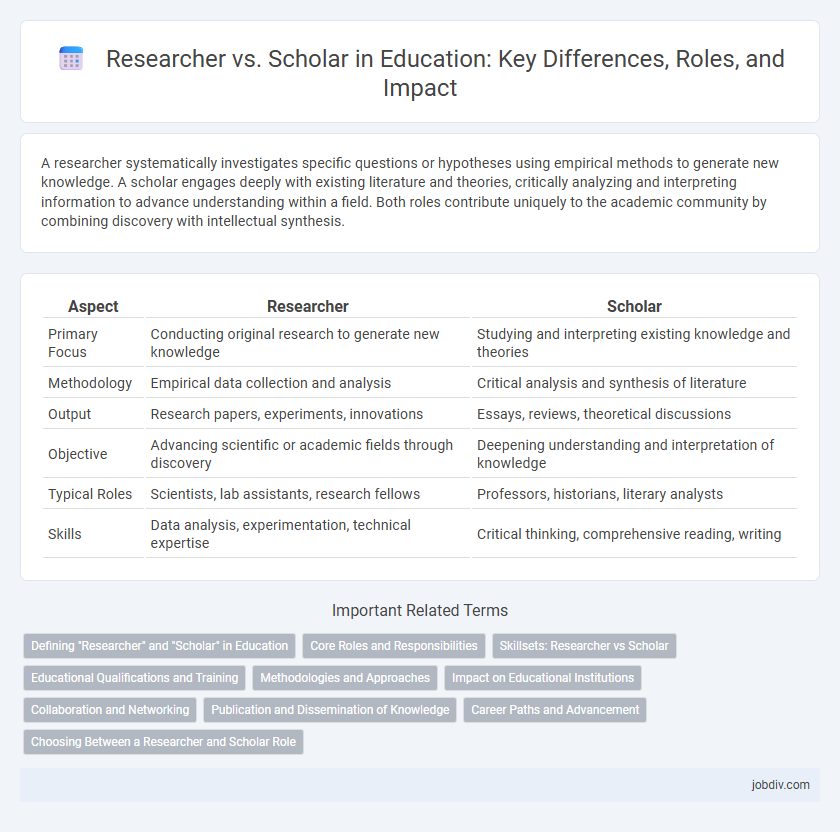A researcher systematically investigates specific questions or hypotheses using empirical methods to generate new knowledge. A scholar engages deeply with existing literature and theories, critically analyzing and interpreting information to advance understanding within a field. Both roles contribute uniquely to the academic community by combining discovery with intellectual synthesis.
Table of Comparison
| Aspect | Researcher | Scholar |
|---|---|---|
| Primary Focus | Conducting original research to generate new knowledge | Studying and interpreting existing knowledge and theories |
| Methodology | Empirical data collection and analysis | Critical analysis and synthesis of literature |
| Output | Research papers, experiments, innovations | Essays, reviews, theoretical discussions |
| Objective | Advancing scientific or academic fields through discovery | Deepening understanding and interpretation of knowledge |
| Typical Roles | Scientists, lab assistants, research fellows | Professors, historians, literary analysts |
| Skills | Data analysis, experimentation, technical expertise | Critical thinking, comprehensive reading, writing |
Defining "Researcher" and "Scholar" in Education
A researcher in education systematically investigates teaching methods, learning processes, and educational policies using empirical data and scientific methods to generate new knowledge. A scholar in education engages deeply with existing theories, critical analysis, and academic discourse to interpret and expand understanding within the field. Both roles contribute to advancing educational practice, with researchers emphasizing data-driven inquiry and scholars focusing on theoretical frameworks.
Core Roles and Responsibilities
Researchers primarily focus on generating new knowledge through experiments, data collection, and analysis, aiming to answer specific questions or test hypotheses within their field. Scholars concentrate on critical analysis, interpretation, and synthesis of existing knowledge, often contributing through teaching, writing, and theoretical exploration. Both roles are essential in advancing education by bridging empirical evidence with theoretical frameworks.
Skillsets: Researcher vs Scholar
Researchers excel in data analysis, experimental design, and critical thinking, driving innovation through empirical studies and systematic investigation. Scholars prioritize comprehensive literature review, theoretical frameworks, and interdisciplinary synthesis, fostering deep understanding and original interpretation of knowledge. Both skillsets complement each other, with researchers generating new data and scholars contextualizing findings within broader academic discourse.
Educational Qualifications and Training
Researchers typically hold advanced degrees such as a Ph.D. or Master's in their specific field, emphasizing extensive training in research methodologies and data analysis. Scholars often possess broad educational qualifications with a focus on theoretical knowledge, critical thinking, and comprehensive literature review across disciplines. Both roles require continuous professional development, but researchers prioritize practical experimentation and empirical studies, while scholars emphasize academic discourse and conceptual frameworks.
Methodologies and Approaches
Researchers employ systematic methodologies, such as experimental designs, statistical analysis, and empirical data collection, to test hypotheses and generate new knowledge. Scholars focus on critical analysis, theoretical frameworks, and comprehensive literature reviews to interpret existing knowledge and contribute to academic discourse. Both approaches utilize rigorous methodologies but differ in emphasis: researchers prioritize empirical validation, while scholars emphasize conceptual understanding and synthesis.
Impact on Educational Institutions
Researchers drive innovation in educational institutions by generating original data and evidence-based insights that inform teaching methodologies and policy development. Scholars contribute by critically analyzing existing knowledge, fostering intellectual discourse, and shaping curricula that uphold academic rigor and cultural relevance. Together, they enhance institutional reputation, attract funding, and create dynamic learning environments that promote continuous improvement.
Collaboration and Networking
Researchers actively engage in collaborative projects that emphasize the generation of new knowledge through experimental and empirical methods, often partnering with institutions and industry experts to advance innovation. Scholars prioritize deep theoretical analysis and critical thinking, frequently networking within academic circles to exchange ideas and contribute to intellectual discourse. Both roles benefit from interdisciplinary collaboration and robust professional networks that enhance resource sharing and collective expertise in education.
Publication and Dissemination of Knowledge
Researchers actively generate new knowledge through systematic inquiry and regularly publish their findings in peer-reviewed journals, contributing to the academic evidence base. Scholars focus on synthesizing existing knowledge, critically analyzing diverse sources, and disseminating insights via books, reviews, and academic conferences. Both roles are essential in advancing education by ensuring rigorous publication standards and effective dissemination of scholarly knowledge.
Career Paths and Advancement
Researchers typically engage in systematic investigation and data analysis to generate new knowledge, often prioritizing laboratory work, field studies, or experimental research. Scholars focus on critical analysis, interpretation, and synthesis of existing literature, contributing to academic discourse through publications and lectures. Career advancement for researchers often involves securing grants and leading projects, while scholars may progress through academic ranks by publishing influential papers and developing thought leadership in their disciplines.
Choosing Between a Researcher and Scholar Role
Choosing between a researcher and scholar role depends on one's focus and career goals; researchers prioritize experimental design, data analysis, and empirical evidence, while scholars emphasize theoretical frameworks, critique, and synthesizing knowledge across disciplines. Academic institutions often value researchers for contributing original findings to scientific progress, whereas scholars foster deep understanding and intellectual discourse through critical evaluation of existing literature. Aligning personal strengths with institutional expectations ensures optimal impact in educational and academic environments.
Researcher vs Scholar Infographic

 jobdiv.com
jobdiv.com